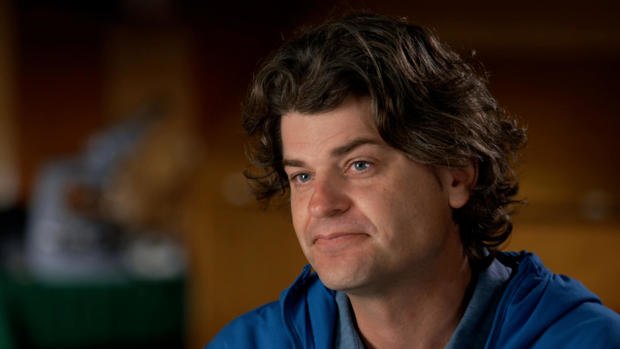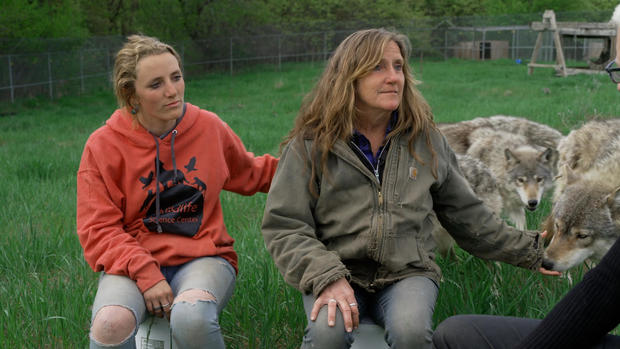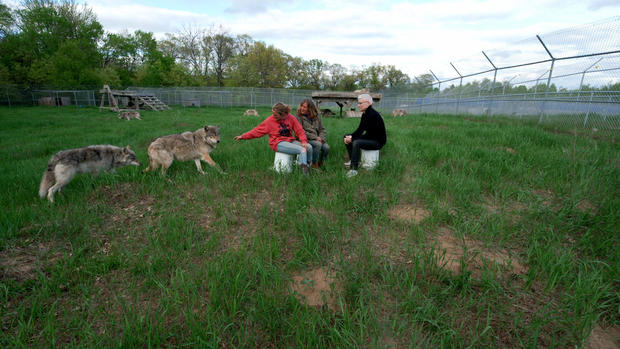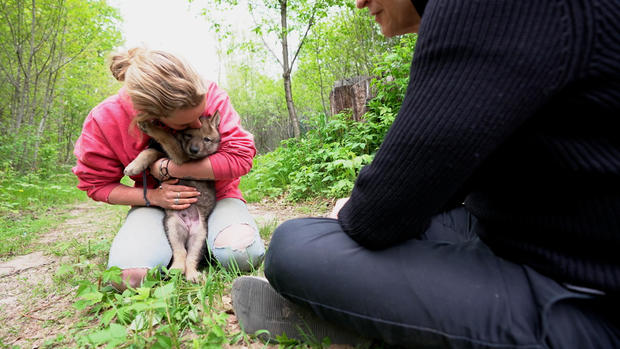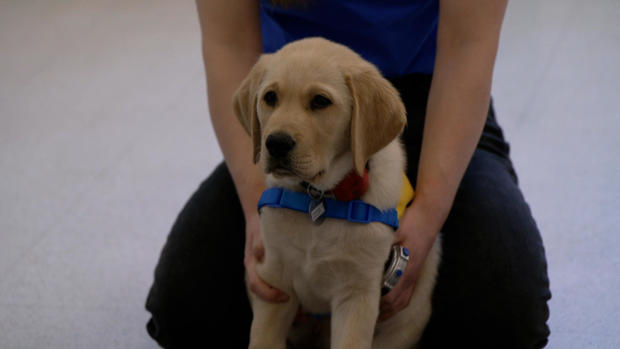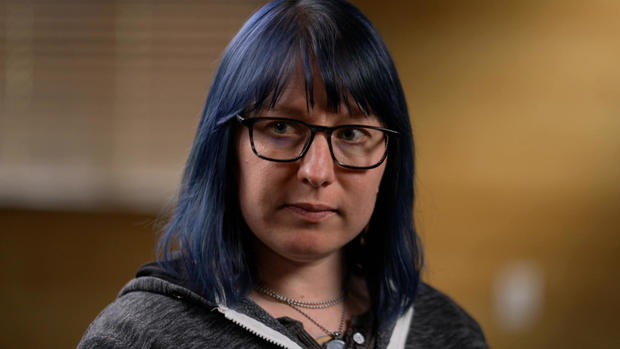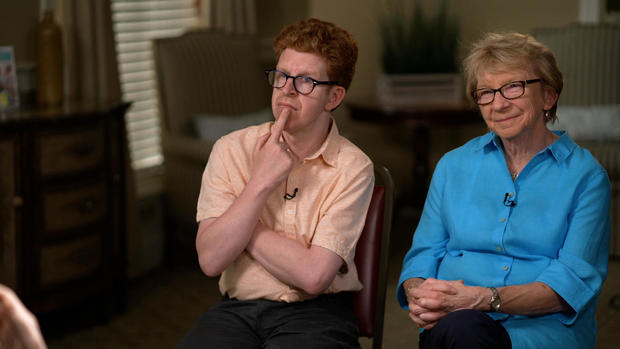60 minutes of research on the genetics and evolutions of dog friendliness
You have a good chance of seeing a dog nearby. What do you know about the origins of dogs? They are most likely wolves. But how did they evolve? What happened when? The truth is that much of this remains a mystery.
However, DNA from dogs and wolves has revealed some interesting clues. These clues could help us gain a better understanding about how they and we evolved. Although survival of the fittest is a common term, a Duke University scientist says survival of the friendliest may be the best way to describe dogs’ evolutionary success.
It is clear that dogs are an evolutionary victory. An estimated billion dogs live on the planet, and they have gotten into every corner of our daily lives. Living with us, working alongside us, and loving us.
Anderson Cooper: What do you want to know about dogs?
Brian Hare says: I am very interested in where the dogs came from. It teaches us a lot about the history of humans.
Brian Hare is an evolutionary biologist at Duke University and has been studying the evolution of animals for 25 years.
Researcher: Puppy, look.
Brian Hare – I think the best way to summarize the connection between human evolution and dog evolution is survival for the friendliest.
Anderson Cooper: Survival of the Fittest?
Brian Hare – So survival of fittest is actually a misinterpretation of evolution in the public’s mind. It’s like the idea that “the biggest and the strongest” are always those who win.
Anderson Cooper: “Might is right.”
Brian Hare says: No, not at all. Exhibit A is the dogs.
Hare said it may seem hard to believe but the sweet dog that you love was once a wild and predatory wolf. Their evolutionary story started at least 20,000 year ago, when humans were hunters-gatherers.
Brian Hare: We believe that wolves chose us. Science supports this belief. A large population of wolves became attracted to humans because they were eating trash that was left behind by people. They were also attracted to humans because they were friendliest and less wolfy than their hunting instincts.
Anderson Cooper: While some wolves could eat scraps, they were not aggressive and they eventually became domesticated.
Brian Hare: It’s just right.
Brian Hare visited the Wildlife Science Center in Minnesota to better understand the divergence between the two species.
Peggy Callahan, the director of the project, is accompanied by her 23-year old daughter Meg. They are both adept at managing a large number of hungry wolves.
Here are 110 graywolves. Some of them were rescued wild, but the majority were raised by Peggy and Meg. They’re separated by chainlink fences and divided into different packs. This pack’s name is derived from the 1980 horror movie “Children of the Corn”.
Anderson Cooper: I watched the film “Children of the Corn” and it was terrifying. What is the name of this “Children of the Corn” pack?
Peggy Callahan: Because of terrifying reasons. They attacked and murdered their father. Then they tried to kill their mother.
Anderson Cooper: This pack–
Peggy Callahan: The pack.
Anderson Cooper: What made them kill their father?
Peggy Callahan: Chance.
Anderson Cooper: Opportunity?
Peggy Callahan says yes.
Anderson Cooper: Wow.
Peggy explained to us that the only reason we could sit among the Children of the Corn was because the wolves see her as the dominant member of the pack.
Anderson Cooper: What is it that makes you dominant in their minds?
Peggy Callahan says: The opposite is dangerous. I know they can kill one another. Their jaw pressure is enormous.
Anderson Cooper: You’re aware that they’re following you even now, with the wolves approaching behind you.
Peggy Callahan (Yes). Your eyes must be on your back.
Anderson Cooper: They are evaluating who we are? Who’s dominant? Could I take this person?
Peggy Callahan says: Yes. Yeah. But I don’t. Hi. Hi. I don’t believe they are planning anything. However, I think they could be incredible opportunists if given the opportunity.
Peggy does everything she can to get the upper hand. Listen to Peggy if you are unsure about her status as the alpha dog.
Anderson Cooper: Could you show me your howl?
Peggy Callahan: Yes.
Peggy Howling…. Wolves howling
Meg Callahan: Every time, goosebumps.
Anderson Cooper: This was just too cool.
Peggy Callahan – Wouldn’t you be able to howl if this happened?
Anderson Cooper: What does the howl mean?
Peggy Callahan – They use it for marking territory. To get out of trouble, they will also howl at anyone who isn’t there.
Meg is able to take over when a pup has to be removed from its mother for research or health reasons.
We were there in May and she took Philo, her one-month-old baby, everywhere. Even to the morning coffee run.
Meg Callahan, if he gets really sexy. Ouch. That’s it. Enough. (Growl). Good boy.
It’s a minor correction. I just pinch and then I growl. Then, he stops growingling and I start to whine.
Anderson Cooper: His mother would have done that?
Meg Callahan said exactly. Yep. (Meg growls) I’m sorry. It was a wolf just like you who was back-talking with me there. It was not you.
Don’t let this fool you, dominance does have its limits. This is MJ.
Anderson Cooper: Is this the dominant female?
Peggy Callahan:
She was also raised by her mother and enjoys a belly rub — until she doesn’t.
Peggy Callahan : She is able to tolerate this with us. I’m mean, she’s…
Anderson Cooper: Right.
MJ lunges at Anderson’s hand…
Peggy Callahan, She’s —- I mean, she’s —- oh—- oh, no she isn’t.
Peggy Callahan says OK. Enough. Ok. Ok. She just said “Stop.”
Anderson Cooper: This is what I heard.
Brian Hare of Duke University has established a Puppy Kindergarten to help you see how far your dog has come because of domestication.
Students raise Labrador puppies and tag along with them — cruising the quad. Basketball practice. Even the photo shoot of the track team.
A portion of the program is dedicated to training service dogs for canine companions within the organization.
Research is being conducted as well. Brian Hare’s group runs behavioral tests on the puppies in order to determine if they are similar to hand-raised pups of wolf dogs.
Researcher: Look. Look. Look. OK.
Puppy follows point.
Researcher: Yes. Good job.
The dog looks back and forth between the researcher and the bowl, and then immediately follows her lead.
Philo, the puppy wolf, may not look like a dog. But, watch him pass the same test.
Hannah points to Philo.
Hannah: Puppy look. Okay baby.
Brian Hare: You can see that Philo did not follow the point..
Anderson Cooper: A puppy at this age would be?
Brian Hare: Completely. Exactly. It seems that dog puppies are more able to understand humans than wolf puppies. Because they are able to interact with us and have been domesticated.
Anderson Cooper: Your testing has been done with dozens upon wolves. What have you discovered?
Brian Hare They want to be with the wolves. This is not the case with dogs. Dogs are what is known as xenophilic. They are attracted by new things and new people.
How much of it is in their DNA? Bridgett vonHoldt (a Princeton geneticist) began comparing DNA from dogs and wolves in 2010.
Anderson Cooper: Have you found some genes that promote friendly behavior?
Bridgett vonHoldt: That’s right. We sequenced a lot of dogs and wolves to search for mutations in our dog genome. After that, we found a nice hot spot of mutations at chromosome 6 in the dog DNA. That’s what we highlighted in this article.
Anderson Cooper: Genetic mutations can be found in dogs that make them more friendly to humans than wolves.
Bridgett vonHoldt: Absolutely.
Anderson Cooper: Wow.
Bridgett vonHoldt (English): This was an important finding in our opinion.
Anderson Cooper: This is something that will have evolved over time.
Bridgett vonHoldt: That’s right. We can see that there were wolves back in pre-dog era, when some of them were making their dens nearer to human settlements. If I could sequence the wolves, I believe they would have two of these mutations while the rest of us might only have one.
Bridgett vonHoldt refers to these “friendliness mutations”.
Anderson Cooper: Is my dog truly in love with me? Is my dog acting according to its genetic code or is it really loving me?
Bridgett vonHoldt is a true lover of you. She has the genetic predisposition of loving you wholeheartedly, more than she possibly can handle.
The next phase of vonHoldt’s research was a surprise to her and us. Her research revealed that the location of friendliness mutations in dogs is the same as genes that cause Williams Syndrome, a rare disorder. Her research revealed one of the earliest genetic links between behavior and genes in dogs and humans.
Meet Ben Monkaba, 36 years old.
Ben Monkaba: Sir, how are you?
Anderson Cooper: I’m fine. Anderson Cooper: I’m well.
Ben Monkaba: Wow!
Ben is no stranger at 60 Minutes. When he was eleven years old, Morley Safer and Ben were working on a story about Williams Syndrome.
Clip from “A Very Special Brain”.
Morley Safer: Morley I’m Morley
Ben Monkaba: Morley Safer?
Morley Safer: He is.
Ben Monkaba: How’s it going?
Williams Syndrome sufferers, such as Ben, can be unusually outgoing and friendly. Some call it “cocktail party personality.”
When Ben jumped up to join the band, we were at his favorite pub.
Anderson Cooper: What makes you different?
Ben Monkaba – What makes me special is my ability to give happiness to people, and my friendliness.
Anderson Cooper: Just meeting you, I have to say that you made me smile from the first moment we met.
Ben Monkaba: It makes me feel accomplished when people are happy.
Williams Syndrome is a condition that can last a lifetime and often leads to serious mental disabilities and other medical issues. Terry Monkaba, Ben’s mom, said that Ben and others like him are so trustworthy and friendly, it is sometimes possible to take advantage of them.
Anderson Cooper: Can you please explain what’s different about Ben genetically?
Terry Monkaba: Yes, Ben is missing 25 genes from chromosome 7. And all of those genes are in line. This means that 1/10th of their genetic makeup is missing.
That deletion in Ben’s DNA — and others with Williams Syndrome — involves the same genes that contain the friendliness mutations discovered in dogs.
Anderson Cooper, Ben: What do you think of that? Is there a connection? There might be a connection between friendliness in dogs and friendliness among humans.
Ben Monkaba: Wow. It makes me so happy to know that people and dogs have many similarities.
Terry, the founder of the Williams Syndrome Association in 2017, was asked by some members for their thoughts.
Terry Monkaba. One of my parents called and said, “Are they kidding?” You know what, you know, I’m certain that my son would love a tail. That really puts it into perspective.
Brian Hare explains why dogs are so friendly and helps us understand how homo sapiens became the dominant species of the Earth.
Anderson Cooper: What does our understanding about dog evolution reveal about human evolution?
Brian Hare – I believe that dog evolution is a way to get ahead in life. It is about finding a new way for dogs to be friends that leads to cooperation. Our species was not the only one that existed 100,000 years ago. There were at minimum four to five other human races. So the question becomes “Well, why is it that we’re the only one left?” We think so, and dogs also point out that we are the friendliest species ever to have evolved among humans.
Survival of the friendliest is a winning evolutionary strategy that many people today would be wise enough to recall.
Denise Schrier Cetta produced this film. Associate producer, Katie Brennan. Broadcast associate, Annabelle Hanflig. Matthew Lev edited.
